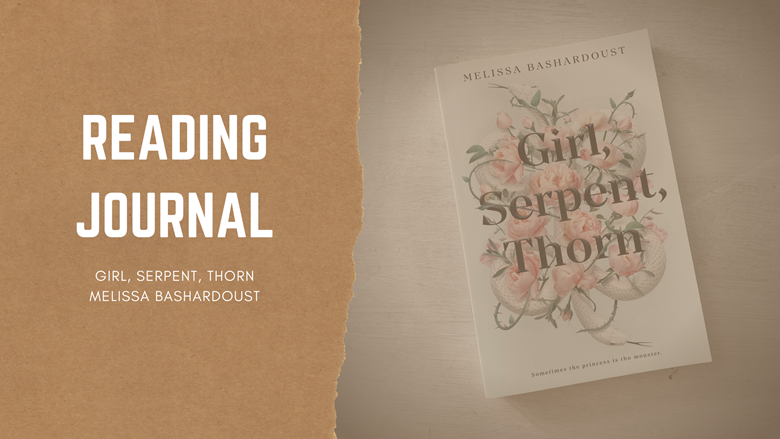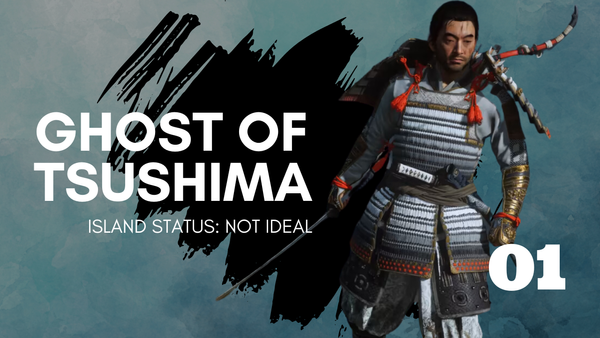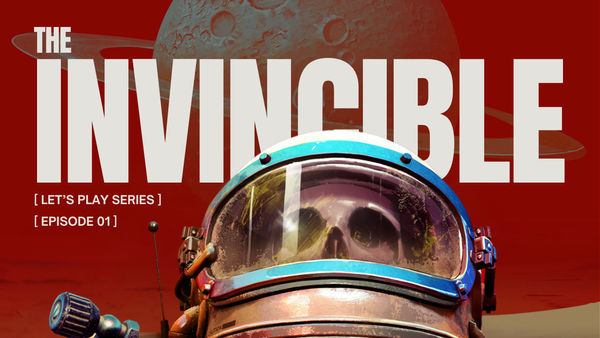Girl, Serpent, Thorn — M. Bashardoust | Reading Journal

SPOILER WARNING: This reading journal contains major spoilers for the events of this story. Here's the spoiler-free version: Girl, Serpent, Thorn | Review.
It didn’t occur to me at first, but when Soraya remarks how much she relies upon being able to be up on the roof of the palace, to feel as though she could be free, seeing the streets sprawl out underneath; that’s when I made the connection to Manu in LOBIZONA. My friend gifted me both of these novels together; and that right there is what binds them together.
Like Manu, Soraya has been hidden away, out of sight, all her life. She has been kept a secret — a dangerous secret. And like Manu, it will be up to her to decide what to do with her curse. Unlike Manu, however, Soraya has known all her life who and what she is. At least to the extent that she knows what it means physically. There’s still the fact that her mother seems to have lied to her about the true origin of her curse — perhaps whether it truly is a curse — and that that is why she may have been the driving force behind Soraya’s isolation; not merely to protect people she might come into contact with.
Yes, skin-to-skin contact with Soraya is deadly; so being around her means having to be careful. But it very quickly becomes apparent that being around her is also very simply a matter of accommodation.
See, not touching someone is quite easy when giving them personal space; and accidents can of course happen but be warded against with, well, clothing. (Pushing Daisies, anyone?) Laleh, for instance, has never had to look where Soraya’s hands are before moving around her — she simply have her room and trusted that Soraya would be careful.
By hiding Soraya away and isolating her, the family both refuse to accommodate her and mistrust her/deny her agency in being mindful. Further down the line we see how fear and shame also heavily contributed to that, but especially in the first third of the novel, I can so well understand the resentment building up in Soraya. It’s no wonder that Azad, showing no fear of holding her gloved hand in his, gains her trust so quickly. Not even her family touch her, take her hands like that. Rather than searching for ways to integrate her, they exclude her completely; even from family life, not just Court. Her mother, Tahmineh, does so to protect her, and shame at her burdening her first-born daughter with this curse in an effort to save her drive her from her side. Nigh on two decades later, it’s all tangled into a web of white lies, secrets kept, and wanting to spare each other the truth. Soraya especially internalises all of her feelings for fear of hurting anyone. It’s such bittersweet irony when it later appears that the full experience of her feelings was the necessary next step to complete the parvik’s gift. Given freely, the parviks’ protection was not a double-edged sword, not power/curse — they never intended for Soraya to be the victim of this blessing. But there was also no instruction manual.
Here’s a bit from the reading journal that did not age well:
Azad is such a good, precious bean, and I love how Soraya finds a mirror of her own rage in him. He becomes her arm <3
Did. not. age well.
I re-read some of the beginning, and the foreshadowing! The foreshadowing! Oh, it’s so good. It’s the kind where you go “OH” later and you go back and ooh, it’s so tasty. Azad easily killing two guards at the temple echoing the Shahmar’s monthly sacrifice of two young men to bathe in their blood? Chef’s kiss.
What’s also expertly done is Soraya navigating the versions of themselves and each other that they see early on, that a fairy tale would let them be, but to see each other as they really are — and themselves, too. Azad pretending to realise that he cannot contain Soraya in whatever human fantasy of the princess he had throws into sharp relief the Shahmar’s insistence that she cannot be contained because of her determination and strength. He still wants to force her into a role: that of the queen by his side. He claims he admires her power, but it all comes crumbling down when it’s clear that being his queen would mean to fulfil his dreams of being Shah, and to validate the blood-soaked history of his reign by remaining at his side.
Soraya is conflicted — she’s angry and resentful because of all this, and the only outlet she allows herself is occasionally killing an insect in the garden. So this story is also about emotions and our fear of “the bad ones.” But there are no bad or dangerous feelings, only how we act upon them. We all get angry, or jealous, we all have cruel impulses. The does not make us bad people — or evil creatures.
Soraya has lived in fear of turning into a div that she’s afraid of every single “bad” emotion. She sees the poison build in her veins, not knowing that her purpose would be fulfilled if she only let them, and she thinks it marks her as ugly, as dangerous, an outward indicator of her feelings.
But the poison in her veins aren’t her intrusive thoughts, or her anger. It’s her fear of those feelings, and her self-loathing for having them.
How legends are told: “There was, and there was not.” Many stories have different versions, different endings — and all are true. Just depends on which one you believe. Soraya’s ability is either a gift or a curse, to her, or perhaps rather than gift I should say power. Soraya’s curse/power. She was, and she was not. She was curse, and she was not. She was given power, and she was not. Her mother cursed her, and she didn’t.
I’d love to write a story that puts duality in the text like that, where certain words function like that.
Curse/power. Cradle/grave. Mundane things, too, like silver/coin; so that the expression isn’t always a dichotomy.
And then, it turns out that Azad is her dream/nightmare. He is still the one that frees her from her shackles — but not through love, as she had hoped. (As they both might have hoped.)
Instead, he had her all twisted around, manipulating her. He is the one who started all this… but Soraya will be the one to end it. The only one who can free herself, and her family.
Some part of the Shahmar way even want to be human again, but he can’t afford to show his weakness to the divs: he has not grasped that they only follow him because he is useful to them, not out of reverence or loyalty. He thinks that if they realise he’s human, they will overthrow and kill him. What Soraya proves is that by surrendering to them rather than wishing to rule them, she earns their loyalty even as she is at her most vulnerable.
She is so hungry for touch, and she can have it now, so she craves it more than ever. It makes her even more vulnerable, and now her life is a tightrope walk of a different kind. The Shahmar/Azad still seeks to exploit it — and he, too, craves it. They both fell in love with the story of the handsome young man coming to fave the Princess from the tower. It’s not Soraya who destroyed that dream, it’s the Shahmar.
I understand her mother so much better now. It’s the story of so many prophecies that parents seek to protect their children from only to deliver them right into the jaws of fate.
The Shahmar doesn’t lie, even in revealing Soraya’s actions to the wedding party. It was revenge. And she had wanted Azad to touch her, to kiss her, to seduce her. And at her kiss, the handsome young man turns into a monster — a monster who had led her to destruction every step, and had her believe it was all her own idea.
It seems impossible at first that the Shahmar and Parvaneh were not working together; but while they may have the same objective — the feather — they couldn’t be more at cross purposes.
Ah, Parvaneh.
Unwittingly, the Shahmar teaches Soraya that her power/curse is not what lends her strength — that fire was always inside her, part of her. And it’s that fire that draws Parvaneh to her like (pardon the pun) a moth to a flame. And it’s Parvaneh who sets Soraya on her journey to realising what that truly means. Something had to give — even if Azad had never come for her. She’d been too full of poison, too afraid to let herself feel anything (p. 269). The rage would have bubbled out of her.
Oh, my bisexual little heart when Soraya mentions her childhood crush on Laleh, and then when there’s that spark between her and Parvaneh.
“She and Parvaneh and Azad — their choices, their mistakes, their ambitions — were all entwined, inseparable from each other. How could she forgive Parvaneh without forgiving Azad? But how could she forgive Azad without forgiving herself? Maybe they all deserved nothing but one another, a constant cycle of betrayals.”
— p. 220
If there is forgiveness for one of them, does it follow that they all must be forgiven? They all were hurt. They all were imprisoned one way or another, they all did what they could/had to to survive, to free themselves and protect others. Only, freeing themselves led each of them to captivity of a different kind; and now they’re all trying to fix their mistakes. And all three of them will be, if they fail, utterly alone.
Forgiveness is an important theme in this book, with the characters never stopped at “I’m sorry but [insert reasons],” but explicitly asking for forgiveness — and not just asking for it, but asking whether the person they wronged can give it.
“Even if she’s upset with you now, if you do right by her, she will forgive you.”
— p. 248
Soraya’s surrender to the divs at the Shahmar’s Court proves that she will be the bridge between humans and divs: the other humans still fear them, and Azad acts like a paternalistic ruler.
Soraya and Azad feel connected in acts of violence (p. 230), and now he brings her a gift: Ramin. And she does finally let herself physically intimate him the way she’d always longed to for how he treated her; even though she’s not deadly anymore, she’s not afraid of him, or of her own anger. She’s herself and not — but either way, she’s free. Free, too, not to let herself give in to the power fantasy.
Ramin is the hero of his own story, and that could be such a tired trope, but he saw Soraya looking at Laleh with longing that he did not understand thought it was jealousy of her freedom, rather than a want to be with her. (People are gay, Ramin.) He thought he was protecting his little sister.
There is pleasure in Soraya lashing out at him, but it makes her sick, too. “Either a mouse of a viper, nothing in between.” (p. 234) It’s so tempting, to give in to what Azad offers her: he’ll end it for her, and she’ll grieve, but she’ll liv eon. But his absolution is empty, the liberty he offers her is conditional, and his touch that one excited/repulsed her now just leaves her numb. It’s when she remembers Parvaneh that she remembers herself, and all that Azad has done to them.
“If I am being cruel, then it’s because he taught me how.”
— p. 260
Soraya is using Azad’s lies against him. The Shahmar is smart enough to suspect the trap, but Azad doesn’t want to find it.
In the end, Soraya’s transformation is finally complete, and it’s no longer a curse/power. It’s a weapon. One that she controls.
When Azad is gone — he had died with the Shahmar and he hadn’t, because he died long ago — there is a better circle left: three betrayers, each of their own kin. Parvaneh. Tahmineh. Soraya. They all have made mistakes, but all three are worthy of forgiveness, and they find it in each other.
And a happy ending for Soraya and Parvaneh <3
Azad thought Soraya beautiful for the threat inside her, and Parvaneh for the fire. But unlike him, she won’t dictate what Soraya does with it — vengeance or peace, she will follow her.
Girl, Serpent, Thorn is a magic, fantastic story about legends and the way they are told: we are, and we aren’t, and what we do with out gifts/curses is up to us. Those who loves us will seek to protect us, and sometimes our choices will lead us astray. But if we do right by each other, love and forgiveness are our reward.
Soraya is a strong, vulnerable, and fully formed protagonist who is all those things at once: soft/cruel, forgiving/vengeful, kind/conflicted; and she is allowed to be all of those things. She has a strong sense of who she wantsto be, and that is her guide, but she explores her darker emotions without apology; and it’s so well done. Her turmoil rang true to me, and never felt hollow or like a plot device. I, too, would have followed Soraya in whatever choice she made — for Parvaneh, or for Azad. Human/monster, they are the same in Soraya. Resistance as well as followed Azad and succumbing to temptation would both have been deeply human choices; and it’s telling that in choosing humanity, Soraya found monstrosity marking her, protecting her; allowing it into herself. Not as a curse, but the gift it was always intended to be.
Bashardoust’s writing flows and ebbs along with Soraya’s emotions beautifully; and the novel is by turns expressive in action and dialogue — especially in scenes between Soraya and Azad, with layers of suspicion, and Soraya and Parvaneh, with their slow reconnaissance of another as allies on opposite sides of a war — as well as deeply introspective in Soraya’s isolation throughout the story. The narrative moves from quick turnarounds (serving to intensify the ‘this is too easy’ feeling of dread leading up to the big twist) to harrowing lengths of uncertainty, but without drawing everything out too long so as to become unbearable.




